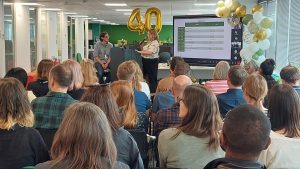
Last week Itad staff joined together for our ‘company business day’. This quarterly event provides an important opportunity for us to collectively celebrate our achievements and reflect on our failures and how we can do better.

June’s event was particularly special because we celebrated our 40th anniversary. Spirits were high and there was an abundance of cake which always goes down well in our Brighton office.
As a company that strives to effect positive social and environmental change through our evidence and learning services, it was only natural that our first session of the day focused on impact. We explored two recent case studies of our work – one with a client where our collaboration led to tangible real-world change and one which didn’t. Then in break-out groups we reflected on why these projects were or weren’t impactful and what were the implications for our ways of working going forward. Some clear patterns emerged.
through our evidence and learning services, it was only natural that our first session of the day focused on impact. We explored two recent case studies of our work – one with a client where our collaboration led to tangible real-world change and one which didn’t. Then in break-out groups we reflected on why these projects were or weren’t impactful and what were the implications for our ways of working going forward. Some clear patterns emerged.
While ruminating on the session over tea and cake, it struck me that the ingredients for impactful evaluations have a lot common with baking. Being mindful of this can help us to develop our strategies to maximise the use and usefulness of our work.
So what can baking teach us about impact?
Here are my takeaways:
1. There must be appetite.
Cake is special. It is best when shared with others who also appreciate it’s specialness and, importantly, are hungry for it. The same applies to evaluations: the potential for impact is greatest when stakeholders have a genuine appetite for learning. For a myriad of (often very understandable) reasons, this is not always the case. The greatest success awaits those clients and partners who are open to change and constantly awake to influencing opportunities with relevant decision-makers whether at practice, programme or policy level. For example, our contribution to helping improve the lives of young women through the Adolescents 360 programme would not have been possible without the implementing teams being open and committed to learning every step of the way.
2. It takes time.
Evidence alone, no matter how rigorous, is not enough to effect change. Just as we must diligently follow a recipe and keep a constant watchful eye on our cake while it is rising in the oven, we must engage with stakeholders throughout the lifecycle of a project to respectfully understand the key issues, build trust and generate buy-in to maximise the use of research and findings. This takes time. Our most impactful monitoring, evaluation and learning (MEL) projects often involve long-term engagement between Itad and our partners, in which we have developed mutual trust to work in a collaborative way to build partners’ skills and systems to monitor and learn from change. A good example of this is our multi-year influential evaluation of the International Fund for Agricultural Development which laid the foundation for important structural and organisational changes.
3. Stories matter.
Behind every good cake is a good story – a big numbers birthday, an anniversary, a new baby – something that stirs emotion. And so too with impact. Storytelling is an often-overlooked journey on the path to impact. But it is a highly effective way of framing an issue, mobilising knowledge, making information more memorable and helping to engage our audiences – thus smoothing the pathways to impact. A live example of this can be seen through our work with the UK Government’s flagship Fleming Fund which is generating evidence and stories that are informing strategic shifts relating to data use and gender equity to reduce disease, illness and death from drug resistance. Our findings are most likely to deliver change if they are easily understood and framed in a way that chimes with a stakeholder’s values and feels unquestionably relevant.
4. It takes a little luck.
There is always a luck factor. Sometimes the cake gods smile on us and sometimes they don’t. Even when we have rigorously considered our methods, nurtured stakeholders and produced high-quality rigorous findings and recommendations, a little ill fortune can undo a lot of hard work. Bad luck can come in many forms, from personnel, political and policy shifts, to pandemics and other unforeseen crises. Sometimes we can use this an opportunity to innovate (as in the case of our work during the pandemic to shed light on people’s resilience to extreme events) but this is rare.
5. It’s a messy business and failure is the greatest teacher
Both baking and cultural change is messy. Each time you bake or conduct an evaluation the process can be complicated and subject to a huge range of variables. Not every cake turns out to be a showstopper and not all evaluations lend themselves to grand plans and big-bang reform efforts – impact is often gradual and iterative. Sometimes a positive outcome eludes us no matter how hard we try. At Itad we regard stories of failure to be equally, if not more, important to share and learn from. We can then adjust our future attempts, gain empathy for others who are in similar situations, learn about ourselves, and try to be more resilient, humble and innovative.
So, as you can see, at Itad we value both cake and impact very highly. Baking and creating impact is both an art and a science. But there are clear patterns that we can be aware of and some simple strategies that we can deploy to be more intentional about achieving a positive outcome. And doing that well can only lead to more celebrations and more cake!
What impact strategies work for you? We’d love to hear your thoughts. Please join the conversation on LinkedIn.

